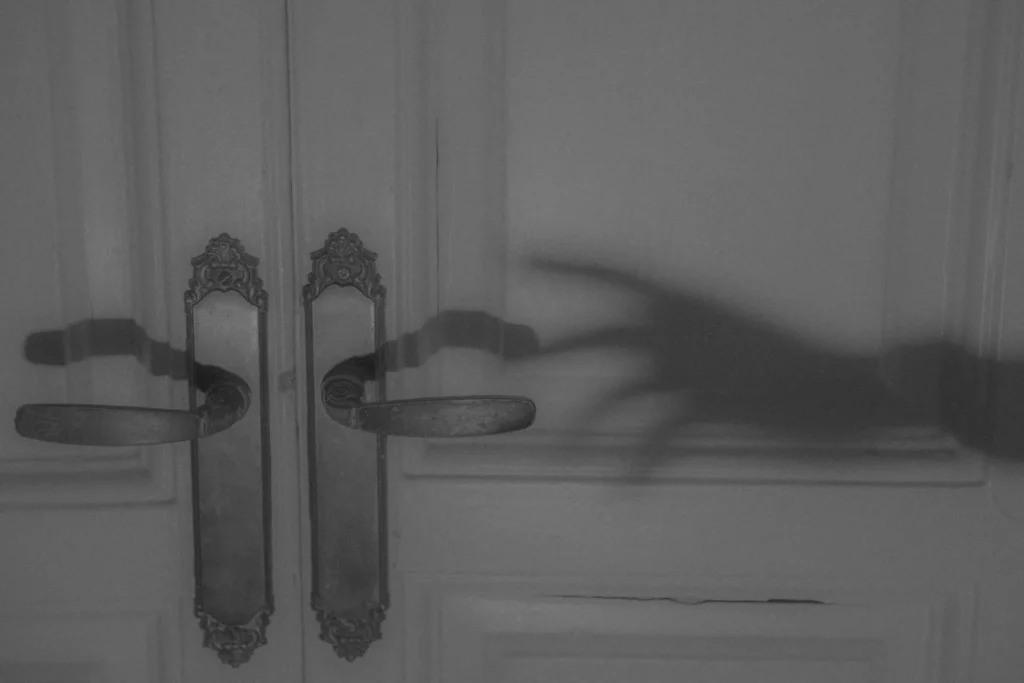Contents
Ghosting is the shadow of a world that has lost its connection.
Christine Rudolph, trauma therapist, systemic coach, alternative practitioner in psychotherapy
From 100 to 0 – from one day to the next. Sometimes even gradually. Always hurtful. In earlier times also known as ‘getting cigarettes’ – with no return.
Ghosting – suddenly disappearing like a ghost – has become an ever-increasing phenomenon and problem. Not only in private relationships or friendships, but now also in the corporate context.
People simply disappear – even if ‘everything was fine’ before. Or rather seemed to be. Poof. Gone. No more messages. No answers. Stalked, blocked.
Ghosting is a sudden and complete loss of contact and communication.
Discarded
This is how people who have been ghosted feel. Thrown away.
A budding relationship. A job interview that went promisingly. An ongoing relationship over a longer period of time. But none of it is as it seemed. This is the (usually later) realisation after ghosting. Suddenly everything is different. Suddenly everything appears in a different light. The budding relationship was an illusion. The job interview that felt like it was going well was a bubble. Nothing the other person said was real.

Traumatic shock
When people realise what has happened to them, it has a profound impact. We may have approached a job interview completely light-heartedly, perhaps even in love and with butterflies in our stomach or a positive excitement. Perhaps there was already a strange feeling in our stomach – almost imperceptible. But the butterflies were bigger. Curiosity about the new.
What comes next is the deep fall. From the bubble to earth. A shock. And what’s more, violent behaviour such as ghosting usually leaves behind a huge breach of trust and often even a post-traumatic stress reaction.
After all, our world view has been torn apart. Our trust has been attacked and even destroyed.
Relationship is communication and contact. Without communication and contact = NO relationship
Ghosting says so much about the ghoster.
Christine Rudolph, trauma therapist, systemic coach, alternative practitioner in psychotherapy
Fear – driving force behind the Ghoster
But why do people ghost? Why do they sabotage a relationship? Is it intentional? What is behind it?
The simple answer is: ghosters are afraid. Sometimes they even realise it. Often, however, they are not. But just because their fear is not consciously accessible to them does not mean that it is not there: it is the driving force. And fear turns into cowardice. And repression.
He (or she) avoids what is unpleasant for the ghoster or where there is a threat of conflict. It is highly likely that anything unpleasant will be swept under the carpet until it is no longer possible. Then, to avoid a possible confrontation, they simply disappear. Silently. Like a ghost. And leaves the other person with question marks and deep wounds.
Sometimes that hurts him – the ghoster – himself. But he simply doesn’t know what else to do. Often, however, he also represses this feeling – under the famous carpet.
People who ghast avoid it. That’s their strategy. Avoid. Repression. They have learnt no other way. If you look a little deeper, there is a great inner need behind it – the need that was felt as a child. And had no justification.
In a trauma-indexed context, this is referred to as an escape reaction (fight/flight/freeze/fawn), which occurs when internal stress is very high. This is what the ghoster ultimately does: he flees from the situation – and chooses the path that is most comfortable for him. In Fight or Flight, our ‘mammoth brain’ is active. That means it’s all about survival. It’s not about ‘finding solutions together’ or ‘talking to each other’ – these areas are not accessible to the fleeing person in this impulse-like moment of survival. He (or she) simply wants to get away (from the ‘danger’).
The ghoster is ‘stuck’, so to speak, due to earlier incisive experiences. Emotionally. They were not allowed to and could not develop, their development was perhaps slowed down by one or more stressful (traumatic) events and their emotional maturation was inhibited as a result. And so there is an adult who is emotionally a 4-year-old – and doesn’t know how else to help himself.
Sometimes there are also other issues behind the ghosting – and the visible and tangible loss of contact is the external reality of an internal avoidant attachment disorder. People who have grown up with this attachment behaviour desire connection, but are unable to ‘endure’ it and avoid it as a result.
The ghosted person: the victim?
A world collapses for him or her. Contact is abruptly terminated – and the former relationship, the WhatsApp messages, the conversations – all of that no longer exists. Without explanation. This is exactly what makes it so difficult, because the closure that would allow the emotional processing of a ‘normal’ break-up to succeed is denied by ghosting.
If the ghoster theoretically acts as the ‘perpetrator’ here, the ghosted person is automatically the ‘victim’ in this constellation. This cycle of the drama triangle must be actively interrupted by the ghosted party.
However, the person being hosted cannot even recognise this underlying dynamic, let alone understand it. No wonder: who understands that another person ‘battened down the hatches’ without warning? The question of WHY is present at first and circles incessantly in the head of the sufferer.
Not understanding, because there is no reason, is also what triggers the deep hurt. Questions like: What did I do wrong? Did I do anything wrong at all? I didn’t do anything wrong! – find no end – there is simply no answer from the other person – and therefore no ‘closure’.
It takes a lot of strength to get out of exactly this situation. And someone to accompany you. Because the cycle that has arisen has – chemically speaking in the brain – an addictive factor.
The first realisation is this: I am not the victim. But my own history has made me one.
The logical consequence of this is what is necessary: Inner (trauma) work.

Always online, but not connected: No connection under this number
The connection to ourselves has been severed. The smartphone has replaced real contact.
We walk in shoes with plastic soles and when we go for a walk, we push the pram around senselessly, unable to see, smell or feel what is happening around us. The baby will grow up disorientated because it can’t make contact and receives no feedback. The dog will go completely mad and will bark at the lead because it has never learnt how contact and communication with its human – and other living beings – works.
We run around without contact and communication – and are surprised that there is no longer any connection. That nobody wants to take responsibility any more. And nobody can have real conversations.
We have lost ourselves.
Inner healing
In order to re-establish contact – with ourselves – we need to do some inner work. This is not so easy, because we have to learn to feel again. To feel. Perceive. Ground ourselves. Get in touch.
But that… is exactly what makes us vulnerable. Possibly also opens up old wounds. This is why we have become – completely fluid and unnoticed – out of touch with ourselves.
The most important steps out of ghosting are
Realisation: I am not the victim – I take responsibility for myself and my health
Seek support: The path out of an emotional addiction and trauma is very rocky on your own
Self-care: What is good for me? Which people drain my energy? Where do I not set boundaries?
The path with well-founded and trauma-sensitive support goes via inner child work, somatic body and systemic work, work with creative approaches, yoga therapy and breathing and certainly also via EMDR.
It is a process in which professional support is essential.
Ghosting in the business and corporate context
Disconnected. Unengaged.
These words, which we normally associate with technical faults or outdated telephone numbers, increasingly also describe our relationships in the corporate world. It remains to be seen whether this is due to the increasingly disruptive and digital world. What is striking is that commitment and respect are increasingly becoming foreign words in companies too.

Ghosting starts as early as the application process. Both on the part of applicants and increasingly on the part of recruiters. The job interview went well – and even months later there is no feedback. The contract was mutually agreed and sent – but nobody signs it or turns up at the office after signing it.
The fact is: If a person tends to ghost ‘in private’, they naturally take this behaviour with them into their working life. We always take ourselves with us – that’s why I don’t differentiate between ‘private’ and ‘business’ behaviour. People shape companies and the corporate culture – and so issues that are not resolved internally are woven into the corporate culture. If there are several people, this behaviour becomes entrenched.
Ghosters are cowards.
They shy away from conflict. Even if there would be no conflict at all. They automatically imply that there will certainly be one if they – from their point of view – cancel. And that’s why they avoid a possible conflict. That’s how they have learnt it.
This kind of disrespect will continue as long as people do not embark on their personal development path. This is my personal opinion and my experience of working with people over the years.
The biggest dilemma here is the role of people who have been placed in management positions and who have no access to themselves, but are in (unconscious) function mode. They are the drivers of toxic corporate cultures, as cultures are always created from the inside out.
Ghosting is more than just a personal offence. It is a symptom of a major shift in our communication culture, one that prioritises anonymity and distance over personal responsibility, empathy, appreciation and respect. It is a sign of how easy it has become in our digital world to end relationships and devalue people.
It is a wake-up call for us all to rethink our (inner) connection and our communication.


